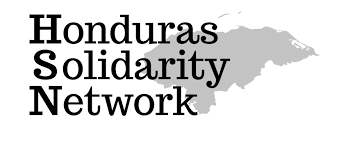- Home
- About Us
- Issues
- Countries
- Rapid Response Network
- Young Adults
- Get Involved
- Calendar
- Donate
- Blog
You are here
Honduras: News & Updates
 Honduras did not experience civil war in the 1980s, but its geography (bordering El Salvador, Guatemala and Nicaragua) made it a key location for US military operations: training Salvadoran soldiers, a base for Nicaraguan contras, military exercises for US troops. The notorious Honduran death squad Battalion 316 was created, funded and trained by the US. The state-sponsored terror resulted in the forced disappearances and extrajudicial killings of approximately 200 people during the 1980s. Many more were abducted and tortured. The 2009 military coup d’etat spawned a resurgence of state repression against the civilian population that continues today.
Honduras did not experience civil war in the 1980s, but its geography (bordering El Salvador, Guatemala and Nicaragua) made it a key location for US military operations: training Salvadoran soldiers, a base for Nicaraguan contras, military exercises for US troops. The notorious Honduran death squad Battalion 316 was created, funded and trained by the US. The state-sponsored terror resulted in the forced disappearances and extrajudicial killings of approximately 200 people during the 1980s. Many more were abducted and tortured. The 2009 military coup d’etat spawned a resurgence of state repression against the civilian population that continues today.
Learn more here:
News Article
April 10, 2021
As we continue to face a refugee crisis on the U.S. southern border, it is imperative to address the destabilizing threat posed by environmental degradation in Central America. In particular, climate change and illegal cattle ranching—often by organized crime and narcotrafficking entities—is driving forest destruction and lawlessness within Central America’s largest wildernesses, directly imperiling the physical, cultural, food and water security of local communities and Indigenous peoples.
Event
April 7, 2021
Dr. Dana Frank, a history professor at UC Santa Cruz, is an expert on Honduras and Honduras/US relations. She explains the current situation: why people are fleeing, the role of the US in supporting the narco-dictatorship, and legislative proposals pending in the US House and US Senate that would cut support to Honduran police/military, as well as to President Juan Orlando Hernández. She is author of Bananeras: Women Transforming the Banana Unions of Latin America (2005) . She is currently researching the AFL-CIO’s Cold War in Honduras, 1954-1979.
RRN Letter
March 25, 2021
Juan Carlos Cerros Escalante, age 41, was president of the Nueva Granada Board of Trustees and a leader of the local Lenca indigenous community in his hometown of Chinda, Santa Bárbara Department. On March 21, unknown assailants fired 40 shots at him in front of his children as they were returning from his mother’s house in the village of Nueva Granada, municipality of San Antonio in Cortés Department. Juan Carlos Cerros Escalante led Communities United of Chinda, a local group opposing the “El Tornillito” hydroelectric dam that is being constructed by HIDROVOLCÁN (Hidroeléctrica El Volcán Company) in hamlets near the Rio Ulúa. This dam, which will be the second largest in Honduras, will mean the disappearance of ten communities of an indigenous Lenca population because the livestock, crops and houses of these two municipalities would drown, and their inhabitants would be forced to move.
RRN Letter
March 24, 2021
For the past few years, residents of El Guapinol have been organizing against the operations of an iron ore mine that is contaminating the Guapinol and San Pedro Rivers, water sources for populations across three departments in northern Honduras. Eight environmental defenders have been held in "pre-trial detention" since September 2019. The UN Working Group on Arbitrary Detention stressed that there is no legal reason to hold these eight men in pre-trial detention and that there is no legal reason to prosecute them. The UN Working Group also recommended that those responsible for the illegal detention should be investigated, suggesting that the State is punishing them for exercising their legitimate rights in defending the environment.
News Article
March 22, 2021
A Honduran Lenca Indigenous activist who helped led a fight against the construction of a dam has been killed. Juan Carlos Cerros Escalante led a local group called “Communities United,” which was active in hamlets near the Rio Ulúa and which opposed the El Tornillito hydroelectric dam. He was shot dead in front of his children. “We condemn the killing of yet another comrade and activist,” said Betty Vásquez, the coordinator of the Santa Barbara Environmental Movement. “It is not conceivable, it is not right, that they criminalize people, persecute people and later kill them for defending the land. We consider this a political assassination.”
News Article
March 22, 2021
US Federal Court ruling: Geovanny Fuentes Ramirez, a native of Honduras, conspired with high-ranking Honduran politicians and military and National Police to operate a cocaine lab in Honduras and distribute cocaine using air and maritime routes. FUENTES RAMIREZ paid a bribe of at least approximately $25,000 to Honduran president Juan Orlando Hernández Alvarado (“JOH”), who was at the time the president of the Honduran National Congress, and allowed JOH to access millions of dollars’ worth of cocaine from FUENTES RAMIREZ’s laboratory. JOH instructed FUENTES RAMIREZ to report directly to JOH’s brother, Juan Antonio Hernández Alvarado (“Tony Hernández”), for purposes of their drug trafficking partnership. Finally, JOH told FUENTES RAMIREZ that he wanted to make the DEA think that Honduras was fighting drug trafficking, but that instead he was going to eliminate extradition and “stuff drugs up the gringos’ noses,” referring to flooding the United States with cocaine.
Event
March 20, 2021 to March 21, 2021
SOA Watch presents a 2-day film festival as a celebration of World Water Day and the communities that put their lives on the line to defend it. Each film will be followed by a community specific panel with fierce Indigenous and Black women leaders. A large group discussion with all the women warriors together will close out the festival. Join us to hear directly from the visionary frontline leaders that are building a global movement to protect the earth, put health over wealth, and show people that another world is possible. Greed and destruction is not our destiny. Free: www.soaw.org
News Article
March 19, 2021
According to payment vouchers for the current melon season for companies of Fyffes in Honduras, they are not paying the minimum wage which was decreed for the agriculture sector in 2020. In April 2020, International Labor Rights Forum, Fair World Project, and the International Union of Food Workers published a report alleging ongoing labour rights violations faced by 6,500 workers on Fyffes’ melon plantations in Honduras since 2016. Abuses detailed in the report include toxic chemical exposure, wage theft, union busting and poor working conditions made more unsafe amid the COVID-19 pandemic. Fyffes is the top importer of melons to the United States, which are sold in major supermarkets across the country. In 2019, Costco and Whole Foods stopped buying Fyffes' Honduran melons due to the ongoing allegations.
News Article
March 16, 2021
Héctor Antonio Trigueros, community and environmental defender from Azacualpa (La Unión, Copán), suffered an attack in which his motorcycle was seriously damaged, while he was unharmed. Hector is one of the main community defenders in Azacualpa, a place where the US-based mining company Aura Minerals has been cyanide-leaching, open-pit mining for years, and where it intends to mine the El Cemeterio hill – local inhabitants are fully opposed to this. Threats, contaminations, explosions, lead poisoning have all resulted. This mining project is supported by President Juan Orlando Hernandez's regime
Content Page
March 3, 2021
Take action to urge your Senators to co-sponsor the Honduras Human Rights and Anti-Corruption Act of 2021, introduced on February 23rd by Senator Merkley and 7 other Senators.
Thank you School of Americas Watch for the Urgent Action


